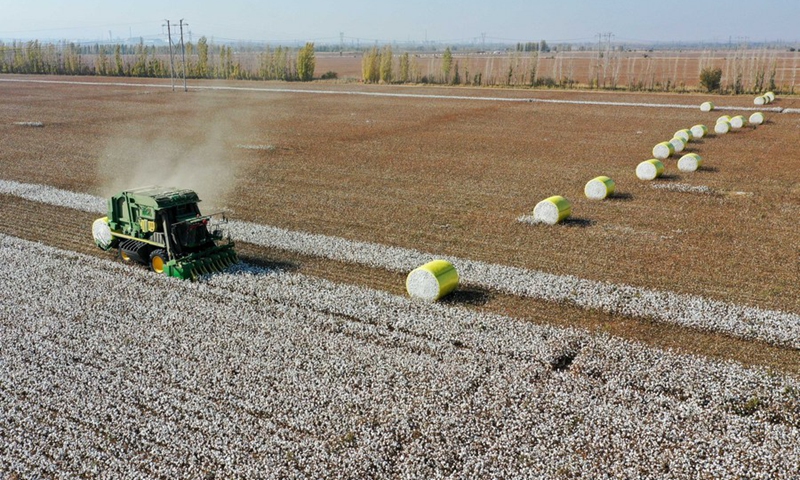
Aerial photo taken on Oct. 17, 2020 shows a cotton harvesting machine working in a field in Manas County, Hui Autonomous Prefecture of Changji, northwest China's Xinjiang Uygur Autonomous Region. File photo: Xinhua
The US' so-called Uygur Forced Labor Prevention Act, which industry insiders dubbed Washington's "fiercest sanctions of the widest scope" targeting Xinjiang with so-called "human rights issues," will wreak havoc on thousands of multinationals' global supply chains that are either directly or indirectly dependent on the world's largest manufacturing powerhouse, industry observers said.
Under the bill, millions of global enterprises will pay a hefty price for "compliance issues" that drastically drive up their costs, as the burden of proof has been passed from US customs to importers and consumers. A more important question is: will they be able to fulfill the requirement? Some could become mired in a chaotic and prolonged process that ends up in a deadlock, analysts said.
US President Joe Biden signed the legislation on Thursday, which bans products made in China's Xinjiang, citing "oppression" of the Uygur and other minority populations, Reuters reported. Key to the legislation is the "rebuttable presumption" that assumes all goods from Xinjiang are made with claimed forced labor, and all imports from Xinjiang are barred unless it can be proven otherwise.
The bill targeted all goods from Xinjiang - in addition to cotton, tomatoes and polysilicon used in solar panels that was already within the US Customs and Border Protection's detaining list - as well as products financed under government-aided projects.
"Under the bill, as long as the products are manufactured in China and resold to the US - regardless of whether China sold it to a third-country or a third-country using materials from China to make downstream products - need to provide proof. That means it affects all Chinese supply chain's exports," Li Ye, a lawyer on international trade and laws and regulations on WTO, told the Global Times on Friday.
Wang Jiang, a distinguished research fellow at the Institute for Frontier Region of China, Zhejiang Normal University, also told the Global Times that the bill will have a "tremendous effect" on global transnational firms, as it impacts not only all exports to the US but also companies listed in the US stock market.
"The 'barrier' [for execution] is also reduced. Previously, the US Tariff Act of 1930 did not include the 'rebuttable presumption,' which means when cargos arrived in the US, it was very hard for US customs to know the manufacturing process, and that's why the execution is very rare even though Washington has long put forward legislation concerning claimed forced labor, " Li said.
"But now with the 'rebuttable presumption' term, the burden of proof is passed on to the importers, giving them endless burdens," Li added.
Xinjiang is known as a major cotton producer where much of the world's material for solar panels is also sourced from. Industry insiders have compared the process of removing "Xinjiang elements" from relevant industrial chains as a "mission impossible."
Can this bill really be implemented as the US wishes? In Li's view, there is a big question on whether firms can achieve the "compliance standards" proposed by the US, and even if they can, how much they will have to pay in "compliance" costs.
Li took the photovoltaic industry as an example, an area in which he has seen how much effort customers put in to make themselves compliant with unreasonable requirements.
Previously, the American Photovoltaic Association issued a guide telling companies how to prove that the photovoltaic panels shipped to the US do not contain silicon materials from Xinjiang, and this guide has changed the entire industry standard.
"The supply chain is very long, from quartz sand to silicon materials, then to silicon wafers and components, there are at least four or five procedures through which different factories are involved. So to what extent should the tracking process go?" Li asked. "Each photovoltaic panel has a bar code, and each bar code will finally be traced back to which furnace produced the silicon material. This is very cumbersome!"
Li said the cost of "compliance" has shifted to importers and users in the US, and also poses a very big challenge to Chinese exporters.
A senior manager of a leading Chinese photovoltaic firm, who prefers not to be identified, also told the Global Times on Friday that it is very unrealistic for US importers to remove Xinjiang photovoltaic materials, as virtually every solar panel shipped from China contains materials from Xinjiang - which is positioned at both upstream and downstream supply chains.
"China has the world's largest solar power capacity. So taking Xinjiang products out of the global photovoltaic chain could be seen as an effort made in vain," the manager said.
Observers said the coercive bill is like "lifting a rock only to drop it on one's own feet," holding hostage the interests of US companies for malicious political aims that would have a catastrophic impact on those firms' business and profits.
The Foreign Affairs Committee of the National People's Congress said on Friday that China will take firm and strong countermeasures if the US insists on acting arbitrarily.




